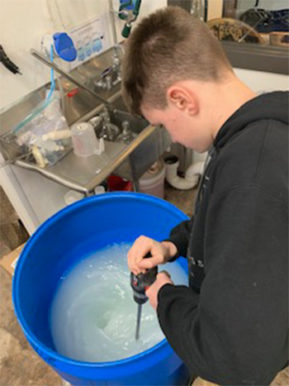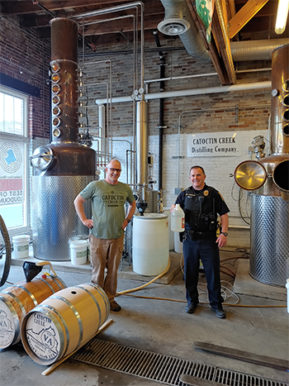During crisis, Va. distilleries pivot to produce hand sanitizer
Some distilleries plan to produce hundreds of gallons weekly.
Sydney Lake //March 24, 2020//
During crisis, Va. distilleries pivot to produce hand sanitizer
Some distilleries plan to produce hundreds of gallons weekly.
Sydney Lake //March 24, 2020//
Last year, Purcellville-based distillery Catoctin Creek produced 60,000 bottles of whisky. But, this week it will produce 24,000 bottles of hand sanitizer to help hospitals and first responders in need during the coronavirus crisis.
Battling the extreme shortage of hand sanitizer, Virginia distilleries have stepped up to fill the void and switched their manufacturing to produce the in-demand alcohol-based product.
“If today, you were just a patriotic citizen wanting to set up a hand sanitizer business overnight, it would take you 6 to 9 months to get that to happen,” says Catoctin Creek founder and General Manager Scott Harris. “It would take you that much time to get the equipment, to get the permits that are required to order bulk alcohol. No ordinary business can just order bulk alcohol. They require special permits from the government. And you have to know the supply chain.”
Since distilleries already meet those requirements, Harris says, they’re in a perfect position to fill the gap.
On Tuesday last week, Powhatan-based Three Crossings Distilling Co. started getting requests from doctor’s offices and home health care businesses that were running low on hand sanitizer, says John B. Davenport, the company’s head distiller and co-founder. After two days of the word spreading that his distillery was producing hand sanitizer, requests were coming in nonstop.
“On Thursday of last week, the phone literally blew up,” Davenport says. “Everyone from HCA hospitals to the federal government to Dominion Energy and other critical services started calling us.”

One hospital chain that contacted Three Crossings uses 8.3 million ounces of hand sanitizer per month, while the distillery has the capacity to produce 3,000 6-ounce bottles per week.
Needless to say, it’s been a fight keep up with the demand.
“We’re a really small distillery, so we simply can’t make enough to even put a dent [in the demand],” Davenport says of his five-person distillery team, which produces approximately 5,000 barrels of vodka, whisky and rum each year. Only hand sanitizers that are FDA-approved can be supplied to businesses and hospitals, which are made from either ethyl or isopropyl alcohol, he says.
The recipe that’s being used for the sanitizer is supplied by the World Health Organization, says Allan Delmare, the distiller at Rappahannock County-based Dida’s Distillery. The alcohol in distilleries has to be purified to 96% alcohol. The recipe then calls for three additional ingredients: glycerol, a thick, sugar-like liquid; hydrogen peroxide to “sanitize the sanitizer;” and demineralized water. The mixture then has to sit for three days to ensure the sanitizer is clean, he says.
“That then creates a hand sanitizer that’s not what you normally think of when you think of Purell,” Delmare says. “It has the viscosity of when you go to the soap dispenser and someone had filled it with water because they didn’t have enough soap. It’s really liquidy, but it’s mostly alcohol.”
According to FDA regulations, nothing else, such as scents, can be added.
The materials necessary for the recipe are in high demand. “It’s sold out everywhere,” Davenport says of the ethyl and isopropyl alcohols. “I’ve been on the phone for the last two days straight trying to find supplies.”
Another item in short supply is plastic packaging. If distilleries aren’t able to secure smaller plastic bottles, hospitals have encouraged them to deliver sanitizer in larger containers that can refill existing containers, Delmare says.
When Catoctin Creek realized it was running out of supplies, the distillery ordered enough materials to make 1,000 gallons of product. Its first batch of 65 gallons served more than 100 families, six police stations, two emergency services, two hospitals, one senior center, and the Federal Aviation Administration in Leesburg.
“The bottleneck here is getting the additives — the other ingredients,” Delmare says. “I could produce 300 gallons here today and use my entire supply [of alcohol] if it was here.”
And the product takes time to produce — as all good alcohol products do.
“We anticipate in about seven to 10 days having six-ounce bottles available to the public and first responders and institutional organizations,” Harris says.
Distilleries have the manpower to produce the product, but finding people to package the materials is another story. The Fairfax Fire Department has offered packaging assistance to Dida’s when its first batch is ready this Friday, Delmare says.
“I’ve got teams of people waiting to help fill the bottles,” Delmare says.

At first, distilleries were donating some of their alcohol supply, but in order to maintain operations, some have turned to selling hand sanitizer in order to continue to buy supplies and retain employees during the COVID-19 crisis.
“We’re going to charge a reasonable price because we have to to keep our rent and our lights on, and our employees working,” Harris says. “We certainly don’t want to be gauging or anything. It should be very affordable.”
Like other distilleries, Lovingston-based Virginia Distillery Co. has been distributing bottles to local and regional first responders, but it will also be donating to the product to be used by Virginia ABC employees, says Marlene Steiner, Virginia Distillery Co.’s brand director. Rocky Mount-based Twin Creeks Distillery is starting its first batch on Wednesday to be dispersed free of charge to the first five organizations that reach out to them first. Any extra product will go to the general public.
Several breweries have also begun fundraising efforts to cover the cost of producing the base alcohol and covering the cost for expedited shipping to obtain additives in time.
The Virginia Distiller’s Association is compiling a list of all the requests that come in from hospitals, police stations and other first responders.
“By the time [the materials] arrive, I’ll have a better idea of whether or not its necessary to pursue going forward,” Delmare says. “If it doesn’t make sense for us, we’ll take that money and donate it directly to other distilleries who have ramped up at a greater scale and help cover their costs and their donations.”
Other companies such as Richmond-based Belle Isle Moonshine are producing hand sanitizer directly for specific hospital systems, such as VCU Health. Other Virginia distilleries producing hand sanitizer include Charlottesville-based Vitae Spirits Distillery LLC, Falls Church Distillers, Afton-based Silverback Distillery, Middleburg-based Mt. Defiance Cidery and Distillery, Hampton-based The Vanguard Brewpub & Distillery and Virginia Beach-based Tarnished Truth Distilling Co.
Although significant efforts are being made, if supply chains become too fraught and the product isn’t able to be produced, some distilleries could close down for good.
“We’ve got visibility for maybe the next three to four weeks of product, but then I don’t know,” Davenport says. “We may simply be out of business.”
S

















